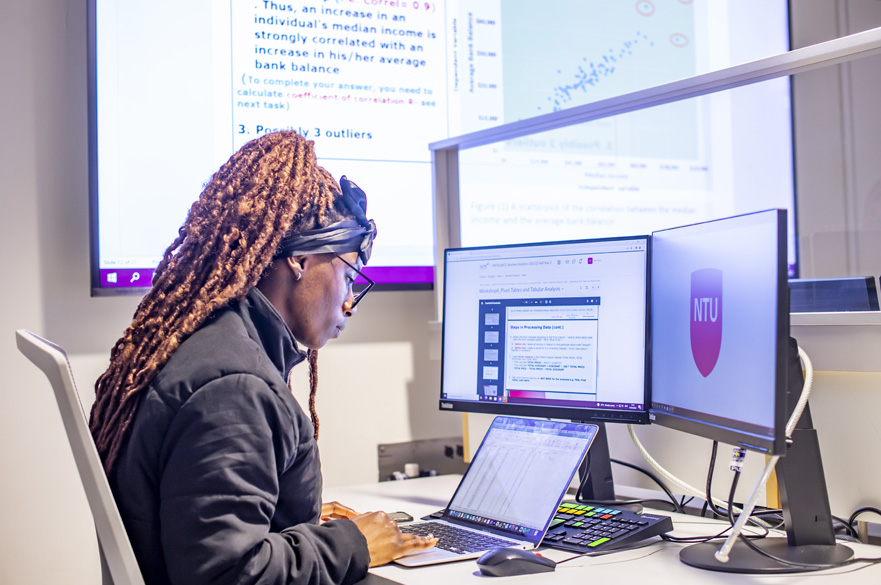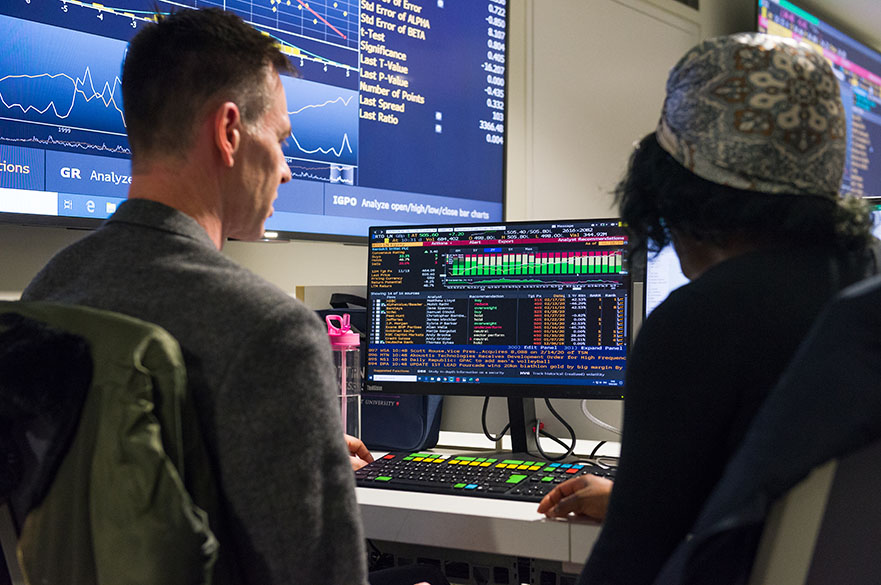Sustainable Finance MSc
About this course
Our MSc in Sustainable Finance is your gateway to a career where innovation meets impact. This programme will equip you to integrate Environmental, Social, and Governance (ESG) principles into financial decision-making, placing you at the forefront of a global movement towards sustainability.
You’ll dive deep into the world of sustainable finance, understanding how it shapes investment, financing, and accounting practices. In your third semester, the Consultancy Experience Project gives you the chance to solve real-world sustainability challenges, working with leading businesses and gaining hands-on experience that sets you apart in a competitive job market.
Through global case studies, interactive learning, and collaboration with diverse peers, you’ll develop a global perspective and build lasting connections. Whether you’re aiming to become an ESG Analyst, Sustainable Investment Manager, or a leader in sustainable policy, this programme empowers you to turn your passion into purpose, shaping a sustainable future with your career. The world needs leaders like you—let’s make it happen.
-
Our students get great jobs. We’ve been ranked 1st in the UK for employability (Uni Compare 2025).
-
Study in the heart of Nottingham, one of Europe’s top 25 student cities and home to over 75,000 learners.
-
At NBS you can create a personalised learning experience, giving you a unique Masters degree that equips you with the skills you'll need, for the career you want.
-
We have been awarded ‘University of the Year’ five times in six years (Whatuni Student Choice Awards 2023, The Times and Sunday Times 2023 and 2018, The Guardian Awards 2019, Times Higher Education Awards 2017).
What you’ll study
At NBS you can create a personalised learning experience, giving you a unique Masters degree that equips you with the skills you'll need, for the career you want. Each of the modules will be delivered over a four week period, with teaching delivered in three weeks and the fourth week left clear for assessment work. This enables you to focus on one subject at a time, whilst allowing time for preparation and assessment work.
- Programme overview
- Semester one
- Semester two
- Semester three
- Ongoing learning/professional development
- Placement opportunities
Semester one modules
- Global Financial Markets
- Financial Statement Analysis
- Corporate Finance
- Transformational Leadership Development
Semester two modules
- Sustainable Finance
- Sustainable Investing
- Sustainable Accounting
- Research Methods for Finance and Accounting
Semester three modules
Your choice of final semester project. Experiential projects include:
- Consultancy Experience Project; or
- Business Research Project
Module for students undertaking the 2 year course
- Placement Diploma in Industrial Experience
Semester one
Global Financial Markets (20 credits)
The aim of this module is to give a complete overview of the financial markets and to understand how they fit into the economic structure. This module provides a comprehensive understanding of the global financial marketplace. You will explore structure, participants, different types of financial markets, regulation and regulatory changes, technology and changing roles of financial markets within society. You will critically evaluate the necessity for free-functioning financial markets and their role in society, set against the set against the extreme difficulty of ensuring free functioning financial markets with ever changing perceptions from different groups in society.
Financial Statement Analysis (20 credits)
This module is designed to provide a complete understanding, interpretation and analysis of companies’ financial statement and critical evaluation of its usefulness for investors and other stakeholders. You will gain a detailed understanding of the content of financial reports and the reporting framework and develop critical understanding of financial analysis techniques and their practical application in evaluating a company’s financial performance and position, for decision making.
Corporate Finance (20 credits)
This module is designed to give you a deeper knowledge of theory and practice in the key aspects of corporate finance and allows you to explore how various aspects of corporate finance are interrelated. You will assess the impact of financial decisions with respect to investments, financing and the management of risk and develop skills in critical analysis and evaluation. This module allows you to develop a detailed understanding of key finance theories and be able to apply theoretical frameworks and practice to companies and other organisations.
Semester two
Sustainable Finance (20 credits)
In this module, you will gain a deep understanding of how environmental, social, and governance (ESG) factors influence financial performance. You will explore crucial concepts such as climate finance, carbon credits, and the consequences of stranded assets, equipping you with the essential skills to analyse and utilise ESG data effectively. Through real-world examples and Bloomberg ESG metrics, this module will prepare you for careers in finance that contribute to a sustainable, low-carbon economy.
Sustainable Investing (20 credits)
This module aims to equip you with foundational principles and advanced strategies essential for sustainable and responsible investing. It covers the core principles of responsible investing, examines the roles and influence of key players within the industry, and delves into specialised investment approaches like thematic, impact, values-based, and faith-based investing.
Sustainable Accounting (20 credits)
This module offers an in-depth exploration of sustainable accounting principles and integrated reporting. You will gain analytical skills to evaluate sustainability-related reporting frameworks, assess regulatory and disclosure requirements, and measure the impact of corporate sustainability initiatives. By the end, you will be prepared to implement sustainable accounting practices that enhance governance, accountability, and ethical business operations in real-world contexts.
Semester three
In your final semester you will take on a major project, giving you a fantastic opportunity to use the theories and knowledge you've gained to produce a challenging, meaningful piece of work. Projects include:
Consultancy Experience Project (40 credits)
Working as part of a team, you will undertake focused research, developing your professional skills, applying theory and skills you have learnt during your course to manage a complex project and deliver results in a real business situation. You will learn and apply valuable project management tools and concepts whilst exploring the requirements of an effective consultancy team and assessment expectations. At the end of the project, you will present your findings to the client and will be required to reflect on your personal development. This is undertaken in the form of secondary research around a focused topic.
Business Research Project (40 credits)
This project is a more traditional piece of independent research, creating an academic research paper, presentation and methodological reflection. Because we believe experiential learning is so important, this project is only available to students with significant prior work experience or a desire to progress to a PhD.
For more information about semester three options please visit our Experiential Projects page.
Ongoing Learning
Throughout the year you will also study the following modules which will help you understand how to manage your own continuous personal and professional development (PPD).
Transformational Leadership Development (10 credits)
Transformational management education is a key focus within NBS, where effective ethical education across all business and management courses is the foundation of our students’ abilities to understand and contribute in meaningful ways towards current and future challenges in the area of sustainable development. The purpose of the module is to increase understanding of how to manage your own continuous personal and professional development in order to enable sustained career success and to be an effective and transformational leader.
Research Methods for Finance and Accounting (10 credits)
The aim of this module is to develop students as effective researchers in different contexts within the economics, finance and accounting subject areas.
Professional development
Beyond your core curriculum and comprehensive career support, you'll have access to a vibrant CPD programme. This includes your Personal Development Week, Global Responsibility Week, and events and workshops including our Business Leaders’ Lecture Series. You'll also have the chance to participate in national and international business challenges, industry talks, field trips, and company visits. We encourage you to get involved in sports, clubs, societies, volunteering, and apply for roles like course rep or student ambassador. These opportunities are designed to enhance your experience, help you thrive in the job market, and support your personal growth.
Chartered Institute of Management Accountants (CIMA)
Our MSc Finance course offers a quicker route to the CIMA Professional Qualification and the global professional designation of Chartered Global Management Accountant (CGMA). The CIMA Professional Qualification is recognised worldwide as the most relevant global finance qualification for a career in business.
You will have 10 exemptions from the CIMA modules which means you just need to complete five CIMA exams to complete the CIMA professional qualification starting at the Operational Case Study (OCS). For further information please visit the CIMA exemptions website.
Placement Diploma in Industrial Experience (2 year course only)
This module aims to develop your understanding of the business and commercial environment. You will apply relevant prior knowledge and skills in the business environment increasing your commercial awareness. On completion of the module, you will have developed a range of skills and have a practical insight into the world of work and possible career opportunities.
If you apply for the two-year option, you can add a year’s work placement onto your course. It’s a great way to put your learning into practice and gain valuable real-world experience to help boost your career prospects once graduating.
Your placement year will last up to 48 weeks (minimum 36 weeks). If you are unable to take a full year's placement, but have completed the minimum 36 weeks you can qualify for a Placement Diploma in Industrial Experience. If you undertake a placement, you must take up the Business Research Project in Semester Three.
Please note that placements are not guaranteed and you will need to work hard in securing one during your first semester. We have a dedicated Employability team who are here to help and support you during the placement process with CV writing, creating a LinkedIn page, interview tips, where to search for a placement etc. You can visit the Employability team’s page for further information.
Please contact us through Ask NTU if you have any questions about securing placements.
We regularly review and update our course content based on student and employer feedback, ensuring that all of our courses remain current and relevant. This may result in changes to module content or module availability in future years.
How you're taught
Teaching and Learning
At Nottingham Business School, we take a unique approach to your learning, blending theory, practice, and real-world experience. You’ll explore different theories and concepts, apply them in practical settings, and reflect on these experiences to enhance your understanding. By observing and analysing business practices—starting with your own—you’ll gain valuable insights that will shape your decisions and actions in the business world.
You’ll also get hands-on experience with Bloomberg Terminals in our dedicated Business Lab, where you’ll access real-time data, breaking news, in-depth research, and powerful analytics—the industry standard for financial markets. Plus, you can complete the Bloomberg Market Concepts certificate at no extra cost, equipping you with essential skills in financial markets.
Guest Lectures
Through our popular Business Leaders Lecture Series, you'll have the chance to listen to experts from a wide range of industries who will share their knowledge with you. Recent guests have included Jason Bates, the co-founder of digital banks Monzo and Starling, who is currently creating new banks and customer propositions in Hong Kong, the US, Europe, Middle East, and the UK with his consultancy group 11:FS.
Finance Simulation
Our approach to teaching incorporates a range of innovative elements aimed at providing you with a practical exposure to financial markets. One of the key highlights of the academic year is our financial markets simulation events delivered by Amplify Trading in association with the major investment bank Morgan Stanley.
Amplify trading is an award-winning FinTech company offering professional training solutions to the world’s largest financial institutions (e.g. Bank of America/Merry Lynch, Deutsch Bank, UBS, S&P).
Morgan Stanley is a major investment bank which operates in more than 42 countries and has approximately 58,000 employees.
During the Amplify/Morgan Stanley simulation events, you will be using the FlowTrader platform to experience the different roles, operations and objectives within financial markets, as you will operate on simulated or real market prices.
Academic Mentors
Each postgraduate student at NTU is assigned an Academic Mentor to guide them throughout the year. Your mentor will support your academic success and help you develop key skills for career progression, personal growth, and professional development.
Assessments
The course uses a variety of assessments tailored to each module, including exams, group presentations, essays, reports, financial analyses, and research projects. Some assessments focus on teamwork, while others evaluate individual skills. Interactive sessions provide valuable feedback before formal assessments, with increased use of eLearning to support your progress.
In-sessional English language support
In-sessional English language classes are offered to international students at no extra cost. The classes aim to provide focused support in the skills you need in order to develop your English in your subject area.
Further information please contact the Nottingham Language Centre based in the Djanogly building on City Campus:
Tel: +44 (0)115 848 6156 | Email: englishsupport@ntu.ac.uk | Website: www.ntu.ac.uk/nlc
Careers and employability
Empowering your career in sustainable finance
Graduates of the MSc in Sustainable Finance are anticipated to secure exceptional roles worldwide, leveraging their expertise to lead in the growing field of sustainability-focused finance. From ESG Analysts to Climate Risk Analysts and Sustainable Investment Managers, you will have the skills to thrive in industries where financial innovation meets environmental and social responsibility.
Graduates of this course are expected to join leading global organisations or embark on entrepreneurial ventures, supported by the extensive resources of Nottingham Business School (NBS) and the wider NTU community. With a solid foundation in sustainable finance and practical consultancy experience, you’ll be well-equipped to take the next step in your career, advancing across diverse sectors and markets.
Practical skills for global impact
This programme combines core knowledge in sustainable finance with hands-on, real-world learning. You’ll master essential skills in areas like sustainable investing, financing, and corporate accountability while benefiting from a curriculum informed by industry needs. Flexible, experiential learning ensures you graduate with the tools and confidence to make a lasting impact.
A personalised and supportive learning environment
At NBS, you’ll join a vibrant, global community of learners and professionals. Our personalised approach to education tailors your experience to your aspirations, with opportunities to choose specialist modules and gain practical experience through consultancy projects. Networking events, industry partnerships, and expert-led workshops provide invaluable connections and insights to boost your career prospects.
With the guidance of our dedicated employability team and access to world-class resources, you’ll graduate ready to shape the future of sustainable finance. Explore how NBS can help you achieve your goals by booking an NTU open day today.
Campus and facilities
You’ll mainly be studying in our brand-new Postgraduate Centre, at the heart of our vibrant City Campus. Designed to support collaborative study, there’s a range of accessible teaching spaces, state-of-the-art technology, breakout areas, quiet work booths and a communal café. You can access dedicated market research reporting platforms and digital resources (e.g. Mintel, Passport, SPSS, and Adobe Creative Cloud) and a room equipped with Bloomberg terminals, which enables you to delve into industry-leading data, news and analytics.
NTU’s City Campus has everything you’ll need to keep occupied between lectures. As well as the Boots Library and its beautiful roof garden, there’s our superb Students’ Union building and two-storey, 100-station gym; a whole host of cafés, bars, restaurants and food outlets catering to every taste; our much-loved Global Lounge; performance and rehearsal spaces for musicians; and so much more!
If that’s not enough, just take a few steps off campus, and you’ll find yourself in the beating heart of Nottingham — one of the UK’s top 10 student cities, and one of the top 25 in all of Europe. It’s a city stuffed with history, culture, and well-kept secrets to discover at your leisure: enjoy lush green spaces, galleries, hidden cinemas and vintage shopping by day, and an acclaimed food, drink and social scene by night. For more details, why not take a Virtual Tour?
Entry requirements
UK students
One year course: You will need an undergraduate degree equivalent to a UK undergraduate honours degree (2.2 or above) containing some evidence of quantitative ability.
Two years with placement: You will need an undergraduate degree equivalent to a UK undergraduate honours degree (2.1 or above) containing some evidence of quantitative ability.
Additional requirements for UK students
- All applicants will be required to demonstrate a commitment to the subject they wish to study and should demonstrate how their chosen programme of study will benefit them in their future career.
- One academic reference is required.
Other qualifications and experience
We welcome applications from students with non-standard qualifications and learning backgrounds and work experience. We consider credit transfer, vocational and professional qualifications, and any work or life experience you may have.
You can view our Recognition of Prior Learning and Credit Transfer Policy which outlines the process and options available, such as recognising experiential learning and credit transfer.
Getting in touch
If you need more help or information, get in touch through our enquiry form.
International students
One year course: You will need an undergraduate degree equivalent to a UK undergraduate honours degree (2.2 or above) containing some evidence of quantitative ability.
Two year course: You will need an undergraduate degree equivalent to a UK undergraduate honours degree (2.1 or above) containing some evidence of quantitative ability.
We accept equivalent qualifications from all over the world. Please check your international entry requirements by country.
English language requirements: See our English language requirements page for requirements for your subject and information on alternative tests and Pre-sessional English.
Additional requirements for international students
- All applicants will be required to demonstrate a commitment to the subject they wish to study and should demonstrate how their chosen programme of study will benefit them in their future career.
- One academic reference is required.
Postgraduate preparation courses (Pre-Masters)
If you need help achieving the academic entry requirements, we offer a Pre-Masters course for this degree. The course is offered through our partner Nottingham Trent International College (NTIC) based on our City Campus.
English language requirements
View our English language requirements for all courses, including alternative English language tests and country qualifications accepted by the University.
If you need help achieving the language requirements, we offer a Pre-Sessional English for Academic Purposes course on our City campus which is an intensive preparation course for academic study at NTU.
Other qualifications and experience
We welcome applications from students with non-standard qualifications and learning backgrounds and work experience. We consider credit transfer, vocational and professional qualifications, and any work or life experience you may have.
You can view our Recognition of Prior Learning and Credit Transfer Policy which outlines the process and options available, such as recognising experiential learning and credit transfer.
Sign up for emails
Sign up to receive regular emails from the International Office. You'll hear about our news, scholarships and any upcoming events in your country with our expert regional teams.
Getting in touch
If you need advice about studying at NTU as an international student or how to apply, our international webpages are a great place to start. If you have any questions about your study options, your international qualifications, experience, grades or other results, please get in touch through our enquiry form. Our international teams are highly experienced in answering queries from students all over the world.
Policies
We strive to make our admissions procedures as fair and clear as possible. To find out more about how we make offers, visit our admissions policies page.











